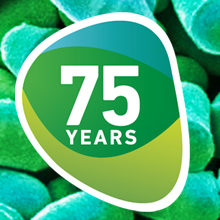Society launches new digital content hub on New Frontiers in Microbiology
06 October 2020

We are launching new collections of digital content for our anniversary, under the heading Why Microbiology Matters. The sixth of these digital content hubs is dedicated to New Frontiers in Microbiology.
Microbes are everywhere and affect almost all aspects of our lives. We cannot see them, but our world would not function without them. Bacteria, viruses, fungi, protists, archaea, algae and other microscopic life forms are on us and in us, in the air, soil and water, and in our food. They are in and on the surfaces of everything in our homes, workplaces and other environments. Most do not harm us and many are essential for the good health of humans, animals and the planet.
In 2020 we celebrate the 75th anniversary of our founding with a year of activities dedicated to demonstrating the impact of microbiologists’ past, present and future – bringing together and empowering communities that help shape the future of microbiology.
We are launching new collections of digital content for our anniversary, under the heading Why Microbiology Matters. The sixth of these digital content hubs is dedicated to New frontiers in Microbiology.
In 2018 we launched a call to the community to nominate a discovery, event or activity that best highlights how microbiology answers big questions by giving us knowledge of very small things.
From the submissions received from throughout the microbiology community, we have created a series of digital content hubs, each examining an important theme in detail, including testimony from our members working in each area and a wealth of rich and interactive content. We will continue to add new content to the hubs as it becomes available, and each one will grow and be added to beyond our anniversary year as a lasting resource for the microbiology community.If you are interested in getting involved, please email [email protected].
New frontiers in microbiology: content brought together for the first time
The sixth in our series, New frontiers in microbiology, will examine the ever-growing tree of life, synthetic biology and the potential of life on other planets.
Content will include:
- An explainer outlining how we have expanded and developed our understanding of how microbes are related to and interact with each other.
- Interviews and case studies from our members working on the innovative science involved in understanding micro-organisms and the development of the tree of life.
- Resources available to explore – including more about archaea and the symbiosis that changed the world, podcasts on microbes on Mars and Antarctic soil fungi, explainer films on archaea, systems biology and extremophiles, as well as a wealth of articles from our blog and our membership magazine Microbiology Today and a dedicated collection from our journals.
We invite the community and all those interested in understanding more about new frontiers in microbiology to access this wide variety of content, brought together in one place for the first time.
A final hub, focusing on microbiology and genetics will be released towards the end of 2020.
Celebrating the impact of microbiologists past, present and future
Join us from 23-26 November 2020 for Why Microbiologists Matter – a digital celebration of the journeys of our members. There will be digital events throughout the week for everyone, including our Fleming Showcase, the final of the Young Microbiologist of the Year 2020 and our AGM.
Other anniversary events and activities during our anniversary year include our microbiology images project, which highlights how microbiology answers big questions by giving us knowledge of very small things.
You can enjoy microbiology in literature by taking part in a book club. Inspired by Jo Verran’s Bad Bugs Book Club, we have released digital guidance on starting your own microbiology book club and understanding how public perception of microbiology is influenced by the representation of the discipline in books and films.
We are continuing work on our policy project, 'A Sustainable Future', demonstrating the value and raising the profile of microbiology in addressing the world’s biggest challenges.
Throughout 2020, we will convert our complete journal archive into the modern format, improving the visibility and reusability of our archive, and preserving our content for the long term.
